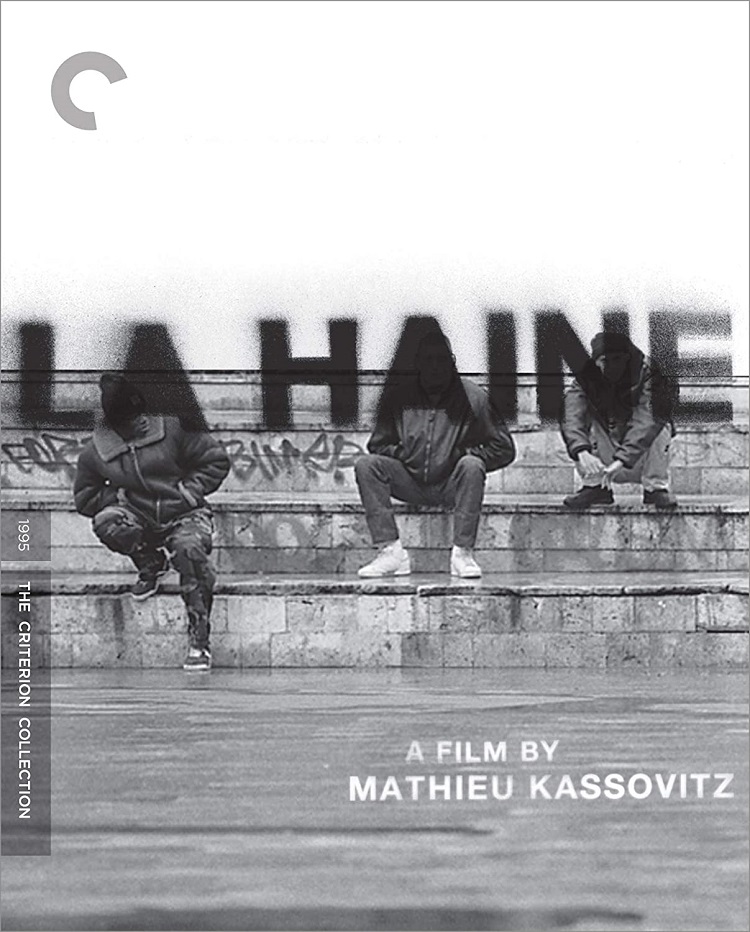
The Film
Mathieu Kassovitz’s 1995 triumph La haine doesn’t pull any punches — it’s right there in the title, which literally translates to Hate. That’s an inflammatory moniker, but Kassovitz means it. The film’s social ills aren’t ascribed to misunderstanding or miscommunication; rather, there’s a seething anger that pulses through every frame. The result is a work with a solitary focus — a focus that doesn’t attempt to answer sociological questions, but dislodge and shove them into our faces with unsettling force.
Set in the projects on the outskirts of Paris, where police violence and murdered immigrants were the norm, the film takes a number of cues from real life in its story of Vinz (Vincent Cassel), Hubert (Hubert Koundé) and Saïd (Saïd Taghmaoui), three friends from diverse backgrounds — Jewish, African and Arabic — united by their intense dislike of the local police force and a fundamental aimlessness.
Lately, the city has been rocked by riots and a North African buddy of theirs, Abdel, lies in a hospital, clinging to his life after being brutally beaten by the police. The need for a catalyst seems barely perfunctory, but Vinz is just waiting for Abdel to die before unleashing a retaliatory salvo. Making the planned revenge even sweeter is the fact that Vinz has recovered a cop’s gun, lost in the tumult of the riots, and he’s looking forward to using it.
Kassovitz doesn’t ever allow for the film to go slack. As the three friends wander the city without real intentions, the film never meanders but steadily builds to a crescendo, aided by snappy editing, confrontational camera work and the strains of Cut Killer’s “Nique La Police” (It means exactly what you think). Casual run-ins with cops and drug dealers feel fraught with danger, one wrong move away from exploding into a violent clash at any moment.
La haine’s vicious cycle of violence, perpetuated by both sides with no end in sight, makes it a difficult pill to swallow, even if its stellar construction blunts the effect a little. The problems are too systemic and the existing damage too widespread to offer a corrective or even much hope, but Kassovitz has one thing going for him — a tangible sense of anger that doesn’t stay confined to the fictional elements onscreen.
The Blu-ray Disc
Presented in 1080p high definition in its original 1.85:1 aspect ratio, La haine gets a strong upgrade over its 2007 Criterion DVD release. The black-and-white image is impressively detailed, with just the slightest hint of grain sitting nicely on top of the picture. Clarity and sharpness only waver during the use of archival footage or deliberately degraded (e.g. a security camera feed) images. Blacks are deep and suffer no crushing even in the most shadowy of scenes, while whites are crisp and not overblown. The film looks fantastic, far surpassing the limitations of its previous SD disc.
The 5.1 DTS-HD Master Audio is also impressive, offering up plenty for the subwoofer and surrounds to handle, with dynamic, immersive urban scenes. Clarity is perfect and dialogue is crisp from the fronts.
Special Features
A direct port of the 2007 two-disc DVD, this edition offers up an array of supplements that doesn’t skimp on quality or quantity, looking at the film from analytical, historical and practical perspectives. Kassovitz contributes an audio commentary, La haine proponent Jodie Foster offers a thoughtful introduction to the film, a handful of deleted scenes (in color) are accompanied by afterwords from Kassovitz and behind-the-scenes footage shows how a complicated fantasy sequence was shot.
Covering both historical and practical bases is a feature-length StudioCanal documentary Ten Years of “La haine,” which details some of the film’s real-life basis and brings together cast and crew for a retrospective look. Several scholars contribute to another piece on the real-life low-income banlieue setting of the film, and the social expectations that surround it.
Also included on the disc are a gallery of production stills and two theatrical trailers. The package includes a booklet with an essay by scholar Ginette Vincendeau and an appreciation by filmmaker Costa-Gavras.
The Bottom Line
An improvement over the already impressive 2007 DVD release, the Blu-ray upgrade of La haine comes highly recommended.